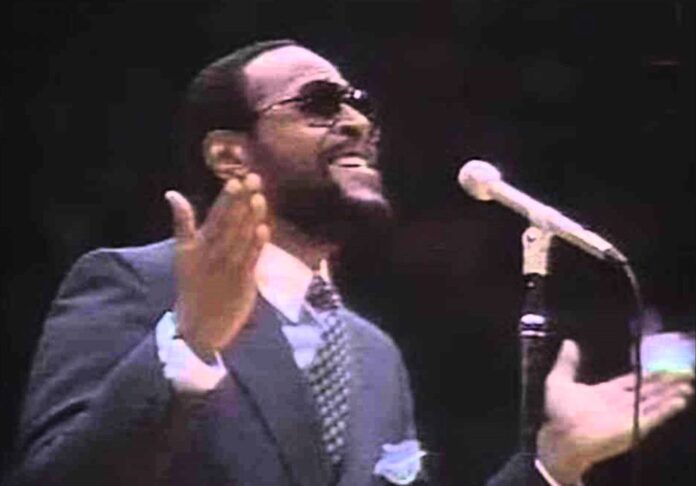I am an enthusiast, fan, and firm devotee to the entirety of Marvin Gaye’s work.
While some may choose the work of Billie Holiday, Jim Morrison, Jimi Hendrix (probably my second), John Lennon, Tupac, or Janis Joplin as their musical paragon, none of those artists subverted the platform to the extent Marvin did.
And he was forever at odds with his Motown label boss Berry Gordy, the visionary auto dealer-turned-record mogul who constantly made a fuss about Gaye’s penchant for missing deadlines for delivering new albums. Motown was run like a machine, and Gordy didn’t like people messing with the timing. But that didn’t penetrate Gaye’s orbit. He remained on message with his boilerplate response: “Berry, I’m always on time.”
The record sales figures in the early to mid-’70s backed up that position.
Gaye performed the national anthem before the 1983 NBA All-Star Game in Los Angeles at The Forum (pre-Staples Center) to an electronic drum track, with minimal synths that emitted so much detached bedroom sex appeal that Marvin received shouts and cheers, mostly from women, before he finished the first stanza of our National Anthem.
“Oh Say Can You See”: It’s probably the unsexiest song on the planet, but not in Marvin’s hands.
At any moment during this showcase on how soul music can conquer all, one might expect lacy undergarments to shower down in his direction, as if it were a late-night “Ladies Only” Vegas concert.
Some would venture that moms, aunties, and daughters (and maybe everyone else) at home, watching on their Sony Trinitron or Magnavox Console, felt that Marvin Heat, too–dude had on some bad shades and a clean suit– and excused themselves from the living room.
Help us save local journalism!
Every tax-deductible donation helps us grow to cover the issues that mean the most to our community. Become a 48 Hills Hero and support the only daily progressive news source in the Bay Area.
Meanwhile, NBA players, coaches, beat reporters, and television analysts are all thinking the same thing: “He dunked on us before the tip-off.”
In an interview with enigmatic writer and filmmaker Nelson George from 1983, documented in The Nelson George Mixtape, Gaye was blunt and concise about the unexpected reception.
“It’s difficult to deal with the national anthem because of its structure. It was written for an operatic type of voice. A soul singer isn’t exactly comfortable singing it, nor is any other ethnic person really. So I think in a country full of ethnic nationalities we should sing it in accordance with what is most comfortable. I can’t sing it white and say I am totally white. I have to sing it so it moves me. Since I am a soul singer I must sing it with soul. Those who are afraid of the sound can’t sing it my way and I can’t see singing it their way. If I’m categorized as a soul singer, I’m going to sing it like one.”
Let’s Get It On, released on August 28, 1973, was Gaye’s 13th studio album and a commercial, cultural, and bedroom sensation. His most financially successful release on Motown, it conquered the world and providing an outline on how to engage in lasting arrangements. With the title track, “Come Get to This,” and “You Sure Love to Ball,” Gaye’s seductive funk helped to establish the fabled “quiet storm” format that dominated Black radio for over a decade.
For the album’s 50th anniversary, it’s receiving a digital upgrade with 33 bonus tracks, 18 of which are previously unreleased. The album becomes legendary with the addition of Herbie Hancock (celebrating a milestone of his own) playing on eight of the tracks, providing a revelation.
Under Motown arranger David Van De Pitte, Hancock played the session, none of which made it to the original album. However, the selections, including five that have been sitting on the shelf since 1973, are now seeing daylight on this release, providing insight into a possible instrumental R&B turn for the jazz legend in the early ’70s.
“Song #1 (Instrumental)” kicks off like an after-hours session jam with Hancock politely making relaxed yet elegant piano runs alongside deep horns, James Jamerson killing it on bass—musically asking, “Ron Carter who?”—and Marvin, you assume, levitating. “Song #4 (Instrumental)” begins with Gaye donning some studio board directions, vocalizing but not really singing—”Squeeze me / ‘Cause I love you so” comes two minutes in, and it grants some extra oomph to the session.
These chance opportunities for both magicians keep my fanaticism fresh for 2023, and reaffirm Marvin’s magnetic soul.
Pick up the Deluxe Edition here.





